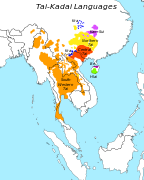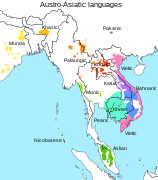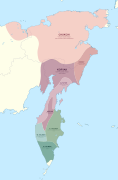東亞語系
外觀
| 東亞語系 | |
|---|---|
| 假定,研究中 | |
| 地理分佈 | 東亞、南亞、東南亞、大洋洲、馬達加斯加 |
| 譜系學分類 | 假定的語言系屬分類 |
| 分支 |
韓語系(有時包括)
日本-琉球語系(有時包括)
阿伊努語(有時包括)
尼夫赫語(不常包括)
楚科奇-勘察加語系(不常包括)
|
| – | |
| Glottolog | 無 |
東亞語系是美國語言學家帥德樂於2001年提出的超語系。無我後來將這一概念進行了完善。
系屬分類
[編輯]- 南亞語系、南島語系、壯侗語系、藏緬語族:孔好古 (1916, 1922)[2][3]和Kurt Wulff (1934, 1942)[4][5]
- 南亞語系、南島語系、壯侗語系、苗瑤語系:白保羅 (1942)、[6]白樂思 (1996)、[7]Ilia Peiros (1998)[8]
- 南亞語系、南島語系、壯侗語系、藏緬語族、苗瑤語系':帥德樂 (2001)
東亞語系假設的前提有:
- 澳台語系 :施古德 (1901, 1902)、[9][10]許家平(2005)[11][12]
- 南方大語系 (南亞語系和南島語系):Wilhelm Schmidt (1906)、[13]Lawrence Reid (1994, 2005)[14][15]
帥德樂 (2005)
[編輯]
帥德樂(2005)[16]提出的東亞語系假設包含一個「長江語系」分支,包含南亞語系和苗瑤語系,形成東亞語系。但帥德樂相信,他提出的長江語系是漢藏語系的直接姐妹群,而非南島語系的,後者距離漢藏語系更遠一些。他總結出的原始東亞語是一種雙音節(CVCVC)語言,使用時間距今8千年以上(6500-6000 BCE),由華北平原上裴李崗文化和磁山文化的雜谷種植者使用(漢江、渭河及黃河中游地區)。[17]
帥德樂(2005)還提出了以下原始東亞語形態詞法詞綴,可見於原始藏緬語和原始南島語,以及尼科巴語族等較保守的南亞語系語言分支中。[18]
- *m(V)- 「在V……」的施事
- *-Vn 「在V……」的受事
- *sV- 「在V……」的工具
- *n(V)- 完成時
無我 (2012)
[編輯]下面的東亞語系關係樹來自無我在2012年於貝拿勒斯印度教大學舉辦的第18屆喜馬拉雅語言專題討論會上所做的演講。[1][19]

據無我所說,東亞語系的語言學證據可以和Y染色體單倍群O的地理分布相重合。[20](更多信息:父系語言假說)
Larish (2006, 2017)
[編輯]據Michael D. Larish,東南亞和東亞的語言都來自一個共同的祖語(他稱為「原始亞洲語」)。日本-琉球語系和韓語系共同組成原始亞洲語的一支。這個分類單元下還有南島語系、南亞語系、壯侗語系、苗瑤語系和漢藏語系。[21][22]
詞彙比較
[編輯]下面是東亞語系五個分支的祖語的基礎詞比較表。
- 資料來源
- 原始藏緬語:Matisoff (2015)[23]
- 原始苗瑤語:Ratliff (2010)[24]
- 原始南亞語:Sidwell & Rau (2015)[25]
- 原始南島語:Blust & Trussel (2020)[26]
- 原始台語:張高峰 (2009)[27]
- 原始黎語:Norquest (2007)[28]
- 原始仡央語:許家平 (2000)[29]
| 漢藏語系 | 苗瑤語系 | 南亞語系 | 南島語系 | 壯侗語系 | |||
|---|---|---|---|---|---|---|---|
| 詞義 | 原始藏緬語 | 原始苗瑤語 | 原始南亞語 | 原始南島語 | 原始台語 | 原始黎語 | 原始仡央語 |
| 發 | *(t)sam | *pljei | *suk, *sɔːk | *bukeS | *prɤmA | *hnom | *m-səmA |
| 目 | *s-myak | *mu̯ɛjH | *mat | *maCa | *p.taːA | *tʃʰaː | *m-ʈaA |
| 耳 | *r/g-na | *mbræu | *-toːr | *Caliŋa | *krwɯːA | *ljəy | *k-raA |
| 鼻 | *s-na ~ *s-naːr | *mbruiH | *mɔːh, *muːh, *muːs | *ujuŋ | *ɗaŋA | *kʰət | *hŋətD |
| 齒 | *s/p-wa | *hmjinʔ | *lmVɲ, *sraŋ, *p(i)əŋ | *lipen, *n/ŋipen | *wanA | *fjən | *l-pənA |
| 舌 | *m/s-lay ~ *s-ley | *mblet | *lntaːk | *Sema, *lidam | *liːnC | *hliːnʔ | *l-maA |
| 手 | *lak ~ *C-yak | *-bɔuʔ | *tiːʔ | *kamay | *mwɯːA | *C-mɯː | *mjaA |
| 骨 | *s/m/g-rus | *tshuŋʔ | *cʔaːŋ | *CuqelaN | *C̥.dukD | *Cuɾɯːk | *dəkD |
| 血 | *s-hywəy-t | *ntshjamʔ | *saːm, *ɟhaːm, *(b/m)haːm | *daRaq | *lɯətD | *alaːc | *platD |
| 肝 | *m-sin | *-hri̯ən | *kləːm, *ris | *qaCay | *tapD | *ɗəy | *təpD |
| 肉 | *sya-n | 原始勉語*ʔaB | *sac | *Sesi | *n.mɤːC | *rəmʔ | *ʔaɯC |
| 狗 | *d-kʷəy-n | '原始苗語*hmaŋC | *cɔːʔ | *asu | *ʰmaːA | *hmaː | *x-maA |
| 鳥 | *s-ŋak | *m-nɔk | *ciːm, *ceːm | *manuk 「雞」 | *C̬.nokD | *səc | *ɳokD |
| 魚 | *s-ŋya | *mbrəuʔ | *kaʔ | *Sikan | *plaːA | *hlaː | *p-laA |
| 虱 | *s-r(y)ik | *ntshjeiʔ | *ciːʔ | *kuCux | *trawA | *tʃʰwəw | *C-ʈuA |
| 葉 | *lay | 原始苗語*mblɔŋA; 原始勉語*nɔmA |
*slaʔ | *waSaw | *ɓaɰA | *ɓɯː | *ɖiŋA |
| 日、天 | *s-nəy | 原始勉語*hnu̯ɔiA | *tŋiːʔ | *waRi, *qajaw | *ŋwanA | *hŋwən | *(l-/h)wənA |
| 月 | *s/g-la | *hlaH | *khaj | *bulaN, *qiNaS | *ɓlɯənA | *C-ɲaːn | *(C-)tjanA |
| 水 | *m-t(w)əy-n ~ *m-ti-s | *ʔu̯əm | *ɗaːk; Pal. *ʔoːm | *daNum | *C̬.namC | *C-nəmʔ | *ʔuŋC |
| 雨 | *r/s/g-wa | 原始苗語*m-noŋC | *gmaʔ | *quzaN | *C̥.wɯnA | *fun | *jəlA |
| 火 | *mey | *douʔ | *ʔuːs, *ʔɔːs | *Sapuy | *wɤjA | *fiː | *puiA |
| 名 | *r-mi(ŋ/n) | *mpɔuH | *-məh | *ŋajan | *ɟɤːB | *pʰaːŋ | *n(ʒ)iA |
| 吃 | *m-dz(y)a-k/n/t/s | P-Mienic *ɲənC | *caːʔ | *kaen | *kɯɲA | *kʰən | *kanA |
| 死 | *səy | *dəjH | *kceːt | *ma-aCay | *p.taːjA | *hlaːwɦ | *pɣonA |
| 我 | *ŋa-y ~ *ka | 原始苗語*kɛŋB | *ʔaɲ | -ku | *kuːA | *ɦuː | *kuA |
| 你 | *na-ŋ | *mu̯ei | *miːʔ | -mu | *mɯŋA | *C-mɯː | *məA/B |
分布
[編輯]另見
[編輯]注釋與參考
[編輯]- ^ 1.0 1.1 van Driem, George. 2013. "East Asian ethnolinguistic phylogeography 網際網路檔案館的存檔,存檔日期2019-04-29.", Bulletin of Chinese Linguistics, 7 (1): 135-188.
- ^ Conrady, August. 1916. Eine merkw rdige Beziehung zwischen den austrischen und den indochinesischen Sprachen. Aufsätze zur Kultur- und Sprachgeschichte vornehmlich des Orients: Ernst Kuhn zum 70. Geburtstage am 7. Februar 1916 gewidmet von Freunden und Schülern, 475-504. München: Verlag von M. & H. Marcus.
- ^ Conrady, August. 1922. Neue austrisch-indochinesische Parallelen. Asia Major: Hirth Anniversary Volume, 23-66. London: Robsthan and Company.
- ^ Wulff, Kurt. 1934. Chinesisch und Tai: Sprachvergleichende Untersuchungen. Copenhagen: Levin & Munksgaard.
- ^ Wulff, Kurt. 1942 [posthumous]. Über das Verhältnis des Malay-Polynesischen zum Indochinesischen. Copenhagen: Munksgaard.
- ^ Benedict, Paul King. 1942. Thai, Kadai and Indonesia: A new alignment in southeastern Asia. American Anthropologist 44:576-601.
- ^ Blust, Robert. 1996. Beyond the Austronesian homeland: The Austric hypothesis and its implications for archaeology. Prehistoric Settlement of the Pacific, ed. by Ward H. Goodenough, 117-160. Philadelphia: American Philosophical Society.
- ^ Peiros, Ilia. 1998. Comparative Linguistics in Southeast Asia. Canberra: Pacific Linguistics.
- ^ Schlegel, Gustave. 1901. Review: 『Elements of Siamese Grammar by O. Frankfurter, Ph.D., Bangkok: Printed at the American Presbyterian Mission Press, Leipzig, Karl W. Hiersemann, 1900』. T'oung Pao (Série II), II:76-87.
- ^ Schlegel, Gustave. 1902. Siamese Studies. T'oung Pao, New Series II, Volume II, Supplement. Leiden.
- ^ Ostapirat, Weera. 2005. Kra-Dai and Austronesian: Notes on phonological correspondences and vocabulary distribution. The Peopling of East Asia: Putting Together Archaeology, Linguistics and Genetics, ed. by Laurent Sagart, Roger Blench and Alicia Sanchez-Mazas, 107-131. London: Routledge Curzon.
- ^ Ostapirat, Weera. 2013. Austro-Tai revisited. 23rd Annual Meeting of the Southeast Asian Linguistic Society, Chulalongkorn University, Bangkok, 29 May 2013.
- ^ Schmidt, Wilhelm. 1906. Die Mon-Khmer Völker, ein Bindeglied zwischen Völkern Zentral-Asiens und Austronesiens. Archiv für Anthropologie Neue Folge V:59-109.
- ^ Reid, Lawrence A. 1994. Morphological evidence for Austric. Oceanic Linguistics 33.2:323-344.
- ^ Reid, Lawrence A. 2005. The current status of Austric: a review and evaluation of the lexical and morphosyntactic evidence. The Peopling of East Asia: Putting Together Archaeology, Linguistics and Genetics, ed. by Laurent Sagart, Roger Blench and Alicia Sanchez-Mazas, 132-160. London: Routledge Curzon, London.
- ^ 帥德樂於2002年7月18日逝世,他的遺稿寫於2001年,出版於2005年。
- ^ Starosta, Stanley. Proto-East Asian and the origin and dispersal of languages of east and southeast Asia and the Pacific. Sagart, Laurent; Blench, Roger; Sanchez-Mazas, Alicia (編). The Peopling of East Asia: Putting Together Archaeology, Linguistics and Genetics
 . London: Routledge Curzon. 2005: 182–197. ISBN 978-0-415-32242-3.
. London: Routledge Curzon. 2005: 182–197. ISBN 978-0-415-32242-3.
- ^ Reid, Lawrence A. Morphological evidence for Austric (PDF). Oceanic Linguistics. 1994, 33 (2): 323–344 [2020-08-10]. JSTOR i285831. doi:10.2307/3623132. hdl:10125/32987
 . (原始內容存檔 (PDF)於2017-08-15).
. (原始內容存檔 (PDF)於2017-08-15).
- ^ van Driem, George. 2016. "The Eastern Himalayan corridor in prehistory 網際網路檔案館的存檔,存檔日期2018-10-09.", pp. 467-524, Vol. II in Elena Nikolaevna Kolpačkova, ed., Проблемы китайского и общего языкознания — Problems in Chinese and General Linguistics. St. Petersburg: Izdatel’stvo Studija « NP-Print ».
- ^ van Driem, George. 2018. "The East Asian linguistic phylum: A reconstruction based on language and genes 網際網路檔案館的存檔,存檔日期2021-01-10.", Journal of the Asiatic Society, LX (4): 1-38.
- ^ Larish, Michael D. Possible Proto-Asian Archaic Residue and the Statigraphy of Diffusional Cumulation in Austro-Asian Languages (PDF). Tenth International Conference on Austronesian Linguistics. January 2006 [2019-01-07]. (原始內容存檔 (PDF)於2019-01-08).
- ^ Larish, Michael. 2017. Proto-Asian and its branches: An archeolinguistic approach for the history of Eastern Asia. Linguistic Society of the Philippines.
- ^ Matisoff, James A. 2015. The Sino-Tibetan Etymological Dictionary and Thesaurus 網際網路檔案館的存檔,存檔日期2020-10-23.. Berkeley: University of California. (PDF 網際網路檔案館的存檔,存檔日期2020-02-02.)
- ^ Ratliff, Martha. 2010. Hmong–Mien language history. Canberra, Australia: Pacific Linguistics. ISBN 0-85883-615-7.
- ^ Sidwell, Paul and Felix Rau (2015). "Austroasiatic Comparative-Historical Reconstruction: An Overview." In Jenny, Mathias and Paul Sidwell, eds (2015). The Handbook of Austroasiatic Languages. Leiden: Brill.
- ^ Blust, Robert; Trussel, Stephen. Austronesian Comparative Dictionary, web edition. 2020-06-21 [November 10, 2020]. (原始內容存檔於2020-08-06).
- ^ Pittayaporn, Pittayawat. 2009. The Phonology of Proto-Tai. Ph.D. dissertation. Department of Linguistics, Cornell University.
- ^ Norquest, Peter K. 2007. A Phonological Reconstruction of Proto-Hlai 網際網路檔案館的存檔,存檔日期2016-03-03.. Ph.D. dissertation. Tucson: Department of Anthropology, University of Arizona.
- ^ Ostapirat, Weera. 2000. "Proto-Kra 網際網路檔案館的存檔,存檔日期2020-11-12.." Linguistics of the Tibeto-Burman Area 23 (1): 1-251.










